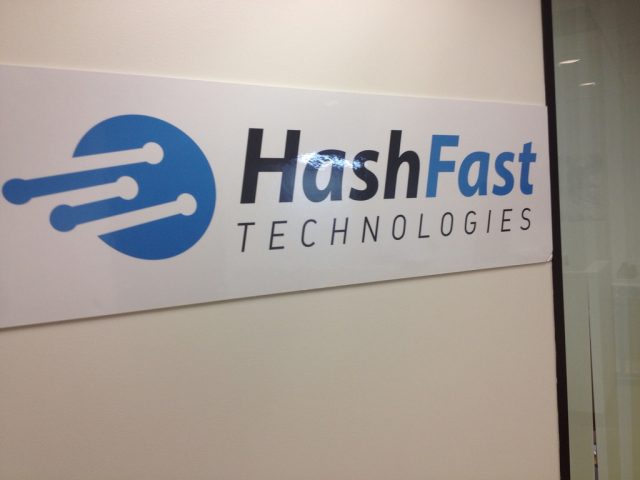
SAN FRANCISCO—Turns out, basically no one wants to buy the remaining assets of a troubled Bitcoin miner manufacturer has $40 million in claims against it from upset customers all over the world.
Last Friday, a federal bankruptcy judge approved a joint statement from HashFast and its creditors (read: those angry customers). Originally, the parties had agreed to hold an auction the day before, but according to a court filing, all the received bids were considered to be "lowball," and the auction was cancelled.
HashFast’s execution problems appear to be endemic to many of its rivals, including Butterfly Labs (which is also facing its own civil suit brought by the Federal Trade Commission) and venture-backed CoinTerra. These companies are frequently unable to deliver mining hardware on time and either significantly delay or outright deny to issue refunds. Of course, in the world of Bitcoin, mining becomes harder over time, so miners quickly diminish in value.
In May 2014, HashFast famously declared "we are not scammers." Days later, CEO Eduardo deCastro told Ars during an interview: "We are as poor as church mice." Then HashFast was hit with an "involuntary bankruptcy petition," a process that eventually resulted in the company filing for Chapter 11 bankruptcy protection and now concludes with the firm selling off nearly everything that it owns.
But rather than auction off the company, HashFast decided to sell its remaining inventory, excluding the remaining chips.
Gracias Señor Ochoa
According to a declaration filed by the court-appointed Chief Restructuring Officer, Victor Delaglio:
That offer was accompanied by a commitment from Mr. Ochoa to permit the Debtors to buy data mining boards that Mr. Ochoa will be building with the Debtors’ assets, and which will be compatible the Debtors’ chip inventory, at a price equal to Mr. Ochoa’s cost. That commitment is valuable to the Debtors because it enables them to sell fully integrated and tested boards using the Debtors’ chip inventory at a price that both is competitive in the marketplace and generates significant margin to the Debtors. In addition, Mr. Ochoa’s offer was accompanied by a further commitment from Mr. Ochoa to permit the Debtors to purchase, again at no markup, a future, fully integrated mining board that is scheduled to be developed early next year. While that future board will not use any of the Debtors’ inventory, the Debtors’ ability to buy the board at cost and then reselling to the public at a margin provides real value to the Debtors and their creditors.
Such a move baffled the veteran bankruptcy judge, Dennis Montali.
"What troubled me was to read that Mr. Ochoa will allow the debtor to buy mining boards?" he said from the bench.
"This is like a patient that is going to die from three different things and now you're suggesting a fourth surgery," he added. "Now they want to do a hip transplant? Why?"
In addition, Simon Barber, a co-founder and chief technology officer, was the sole person to put in a bid to leave the company and to buy his remaining debt, which was also available for auction.
Other court filings show that as of September 14, 2014, HashFast had over $7 million in assets, but over $14 million in liabilities and only about $124,000 cash on hand.
Barber’s bid consists of a cash payment of $20,000—payable via $10,000 immediately and followed by $500 per month for 20 months—and "contribution of up to 60 hours of consulting services and a "waiver of all potential claims against the estate, which could exceed $20,000."
Shortly before the hearing adjourned, Montali expressed his puzzlement in the entire affair and wondered why the company simply didn't just convert its Chapter 11 bankruptcy protection into a Chapter 7, which allows a company to liquidate under American bankruptcy law.
"The observation that I’ve had since Day 1: I've expressed the unusualness of this new business called Bitcoin coming into our old familiar bankruptcy world, and I find it beyond belief that someone who understands Bitcoin wouldn't have the slightest interest under the bankruptcy code," Judge Montali said. "I'm going to defer to the judgement of the committee and the judgement of the debtor."
Ars has reached out to both Barber and deCastro (who was in attendance for the hearing) to better understand how the company fell apart.
UPDATE December 9 4:21pm CT: DeCastro called Ars to correct the record that the buyer is, in fact a different Guido Ochoa. This Ochoa, according to deCastro, runs a plastics factory. Ars has corrected the headline to reflect this fact.
Ochoa has also previously bought other company assets, and court records also show he is the company’s second largest customer, having spent $800,000 previously.
When Ars asked if Ochoa's interest in Bitcoin stemmed from the fact that Venezuela has had intense capital export controls and continues to have high inflation, deCastro somewhat agreed.
"I think it's a very indirect connection," he said. "He believes that there is a better market for mining equipment in the Spanish-speaking world because multiple countries have gone through the experience of hyper-inflation."
DeCastro, who has resigned as CEO, but remains the company's sole effective employee, agreed to put Ars in touch with Ochoa.
Ars regrets the errors.
reader comments
35